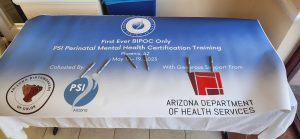 We are coming up on the second year Juneteenth has been Federally recognized as a National Holiday. Juneteenth is a celebration that marked the end of slavery Juneteenth.
We are coming up on the second year Juneteenth has been Federally recognized as a National Holiday. Juneteenth is a celebration that marked the end of slavery Juneteenth.
June 19, 1865, is when the news reached Texas. The enslaved blacks were notified that slavery had ended. Slavery ended January 1, 1863.
Yes! You read that correctly.
Two and a half years after the signing of The Emancipation Proclamation. Two and a half years later, Union Soldiers reached Galveston, Texas. Two and a half years later, 250,000 lives were changed. Two and a half years later, the reason we celebrate Juneteenth was born. Two and a half years later, enslaved people were notified of their freedom. To learn more of the history behind Juneteenth, check out this article.
As America continues to celebrate Juneteenth, we, as BIPOC, black indigenous and people of color, are also creating new historic moments. I was listening to a Bluebell Ice Cream Commercial one day. This day when it came on the radio, I actually paid attention to the words. “The Good Old Days, Are Being Made Right Now!” That lyric stuck with me. Almost like an epiphany. Almost as if it was a life lesson. As if someone who wrote that lyric understood that everything we are currently living will be history. We are currently living history. When I reflect on my life, I’ve lived through many moments that are currently in the history books. Our lives are history in the making. When I think of it like that, it is important for me to be a part of history. To help pave the way for others coming up behind me.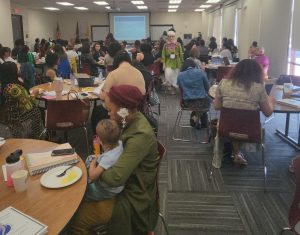
When I was presented with an opportunity to volunteer with Postpartum Support International, PSI, and Arizona Birth Workers of Color, AZBOC, I was elated. This was their first ever BIPOC only PSI training.
I attended the PSI training last year and plan to sit for the certification in July. Now I know you might wonder what is PSI and why is it important to me? I will gladly discuss these organizations, but first let me share why PSI is important to me.
I took my first postpartum patient in 2010. I was 2 years into my nursing career. I still wasn’t sure what I wanted to do with the rest of my career. I worked nights, which allowed me the opportunity to study for my masters. My Med Surg unit rarely took postpartum patients, but our census was fairly low for the number of nurses working most nights. I always volunteered to take the couplets. Once I learned the assessment skills, it was fun.
I didn’t know it then, but I do now. The map of my career path was being drawn out. You know, when you are at the kiosk in the mall, the one with the map. You start looking for the ‘YOU ARE HERE’ sign so you can find your exact store. I was there starting my journey.
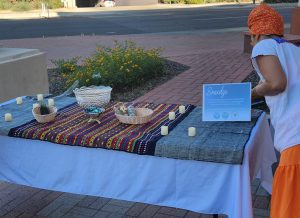 It wasn’t until after I became a mom; I realize how important it was to help other moms. My experiences navigating the healthcare system had its own challenges. Oh, being a mom, you know, learning on the job. I was dealing with postpartum anxiety with my first and didn’t realize it until years later. Not to mention postpartum experience after a loss. Yeah, and the postpartum period after multiples. After these three vastly unique experiences, I realized the lack of support I had during my postpartum period. Sure, I had my husband, mom, friends, but it felt lonely. I felt like I couldn’t express how I felt because no one would understand. That is until I starting talking to other moms. I started building my network of moms to connect with. I needed those connections. It was in those connections I realized other moms also needed more support transitioning into their new role. It’s a new role every time you transition from pregnancy to postpartum. It’s a new role because the previous role no longer fits. You are no longer that person prior to pregnancy, even if it’s not your first.
It wasn’t until after I became a mom; I realize how important it was to help other moms. My experiences navigating the healthcare system had its own challenges. Oh, being a mom, you know, learning on the job. I was dealing with postpartum anxiety with my first and didn’t realize it until years later. Not to mention postpartum experience after a loss. Yeah, and the postpartum period after multiples. After these three vastly unique experiences, I realized the lack of support I had during my postpartum period. Sure, I had my husband, mom, friends, but it felt lonely. I felt like I couldn’t express how I felt because no one would understand. That is until I starting talking to other moms. I started building my network of moms to connect with. I needed those connections. It was in those connections I realized other moms also needed more support transitioning into their new role. It’s a new role every time you transition from pregnancy to postpartum. It’s a new role because the previous role no longer fits. You are no longer that person prior to pregnancy, even if it’s not your first.
It was my experience that fueled my passion and then I found PSI, Postpartum Support International, a few years ago. I knew then I would take the course and certify. I knew this was where I wanted to take my career. I want to help mothers feel heard and supported. “Postpartum Support International (PSI) was founded in 1987 by Jane Honikman in Santa Barbara, California. The purpose of the organization is to increase awareness among public and professional communities about the emotional changes that women experience during pregnancy and postpartum. Approximately 15% of all women will experience postpartum depression following the birth of a child. Up to 10% will experience depression or anxiety during pregnancy. When the mental health of the mother is compromised, it affects the entire family.”
Lakisa Muhammad is the Executive Director of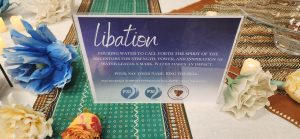 Arizona Birth Workers of Color. “Arizona Birth workers of Color is an organization dedicated to the growth, fellowship, and support of people of color within birth-related fields in Arizona. Arizona Birth workers of Color (AZBOC), founded in 2016, is a collective group of people of color who offer services that support families before, during, and after childbirth. We are also advocates, stakeholders, business owners, and leaders within the field of birth work locally and nationally. The overreaching intention of AZBOC is to uplift, support, and create space for connection amongst Birth workers of Color in Arizona.”
Arizona Birth Workers of Color. “Arizona Birth workers of Color is an organization dedicated to the growth, fellowship, and support of people of color within birth-related fields in Arizona. Arizona Birth workers of Color (AZBOC), founded in 2016, is a collective group of people of color who offer services that support families before, during, and after childbirth. We are also advocates, stakeholders, business owners, and leaders within the field of birth work locally and nationally. The overreaching intention of AZBOC is to uplift, support, and create space for connection amongst Birth workers of Color in Arizona.”
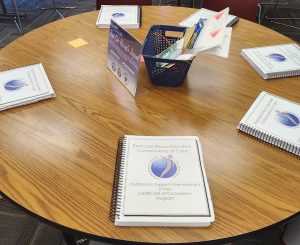 It was monumental being at the first PSI BIPOC only training. In those 3 days, I felt connected in a way I can not explain in words. I felt understood, supported, heard, and loved without even sharing my story. It was a safe space for many to share their experiences. I felt all the emotions in the room. We were surrounded by our culture from an altar, smudge and libation stations. Many came dressed in traditional garments or shirts, celebrating their culture. We were incorporating our ancestors at this celebratory moment. We discussed our traumas, pain, healing, and growth. It was history in the making and I am glad to have been a part of it. In celebrating Juneteenth, I celebrate the past, present and future.
It was monumental being at the first PSI BIPOC only training. In those 3 days, I felt connected in a way I can not explain in words. I felt understood, supported, heard, and loved without even sharing my story. It was a safe space for many to share their experiences. I felt all the emotions in the room. We were surrounded by our culture from an altar, smudge and libation stations. Many came dressed in traditional garments or shirts, celebrating their culture. We were incorporating our ancestors at this celebratory moment. We discussed our traumas, pain, healing, and growth. It was history in the making and I am glad to have been a part of it. In celebrating Juneteenth, I celebrate the past, present and future.
If you are struggling during your pregnancy or postpartum period, please get help. You can reach out to your provider or PSI website for resources. You do not have to do it alone.











